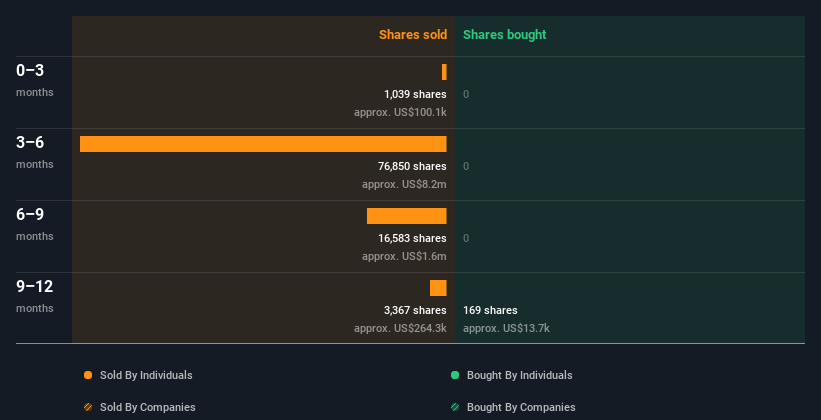- United States
- /
- Professional Services
- /
- NasdaqGS:EXPO
Exponent Insiders Sell US$10m Of Stock, Possibly Signalling Caution

The fact that multiple Exponent, Inc. (NASDAQ:EXPO) insiders offloaded a considerable amount of shares over the past year could have raised some eyebrows amongst investors. When analyzing insider transactions, it is usually more valuable to know whether insiders are buying versus knowing if they are selling, as the latter sends an ambiguous message. However, shareholders should take a deeper look if several insiders are selling stock over a specific time period.
While insider transactions are not the most important thing when it comes to long-term investing, we do think it is perfectly logical to keep tabs on what insiders are doing.
See our latest analysis for Exponent
The Last 12 Months Of Insider Transactions At Exponent
In the last twelve months, the biggest single sale by an insider was when the Executive VP, Richard Schlenker, sold US$6.2m worth of shares at a price of US$107 per share. So what is clear is that an insider saw fit to sell at around the current price of US$98.04. We generally don't like to see insider selling, but the lower the sale price, the more it concerns us. We note that this sale took place at around the current price, so it isn't a major concern, though it's hardly a good sign.
All up, insiders sold more shares in Exponent than they bought, over the last year. You can see the insider transactions (by companies and individuals) over the last year depicted in the chart below. If you want to know exactly who sold, for how much, and when, simply click on the graph below!

For those who like to find hidden gems this free list of small cap companies with recent insider purchasing, could be just the ticket.
Insiders At Exponent Have Sold Stock Recently
The last quarter saw substantial insider selling of Exponent shares. Specifically, Independent Director Carol Lindstrom ditched US$100k worth of shares in that time, and we didn't record any purchases whatsoever. This may suggest that some insiders think that the shares are not cheap.
Does Exponent Boast High Insider Ownership?
Many investors like to check how much of a company is owned by insiders. A high insider ownership often makes company leadership more mindful of shareholder interests. Insiders own 1.2% of Exponent shares, worth about US$61m. We've certainly seen higher levels of insider ownership elsewhere, but these holdings are enough to suggest alignment between insiders and the other shareholders.
So What Do The Exponent Insider Transactions Indicate?
An insider hasn't bought Exponent stock in the last three months, but there was some selling. Zooming out, the longer term picture doesn't give us much comfort. But since Exponent is profitable and growing, we're not too worried by this. Insiders own shares, but we're still pretty cautious, given the history of sales. We're in no rush to buy! Of course, the future is what matters most. So if you are interested in Exponent, you should check out this free report on analyst forecasts for the company.
But note: Exponent may not be the best stock to buy. So take a peek at this free list of interesting companies with high ROE and low debt.
For the purposes of this article, insiders are those individuals who report their transactions to the relevant regulatory body. We currently account for open market transactions and private dispositions of direct interests only, but not derivative transactions or indirect interests.
Valuation is complex, but we're here to simplify it.
Discover if Exponent might be undervalued or overvalued with our detailed analysis, featuring fair value estimates, potential risks, dividends, insider trades, and its financial condition.
Access Free AnalysisHave feedback on this article? Concerned about the content? Get in touch with us directly. Alternatively, email editorial-team (at) simplywallst.com.
This article by Simply Wall St is general in nature. We provide commentary based on historical data and analyst forecasts only using an unbiased methodology and our articles are not intended to be financial advice. It does not constitute a recommendation to buy or sell any stock, and does not take account of your objectives, or your financial situation. We aim to bring you long-term focused analysis driven by fundamental data. Note that our analysis may not factor in the latest price-sensitive company announcements or qualitative material. Simply Wall St has no position in any stocks mentioned.
About NasdaqGS:EXPO
Exponent
Operates as a science and engineering consulting company in the United States and internationally.
Flawless balance sheet with proven track record and pays a dividend.


